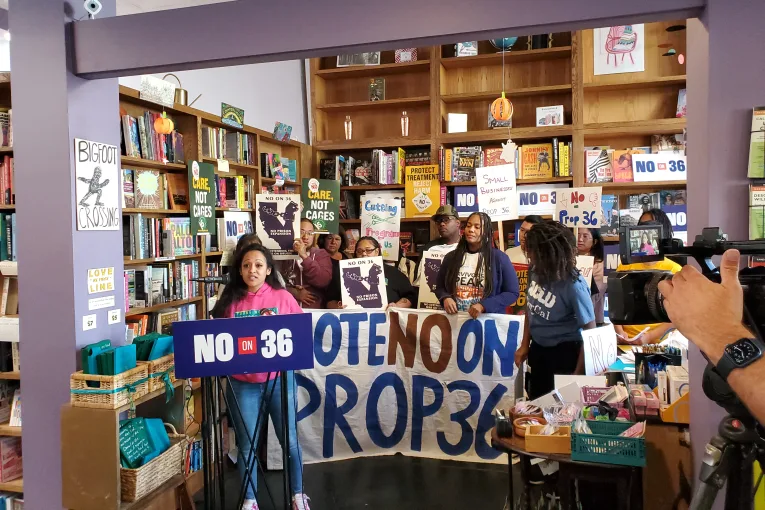
Disclaimer: Opinions are those of the writer and do not reflect those of The Vanguard or its Editorial Staff. The Vanguard does not endorse political candidates and is committed to publishing all public opinions and maintaining an open forum subject to guidelines related to decency and tone, not content.
A group of small business owners, system-impacted individuals, and community advocates gathered inside Booksmith in San Francisco Tuesday morning to sound the alarm on Proposition 36, a measure on the November ballot.
Rally goers warned that Prop. 36 would gut funding for critical crime-prevention and drug treatment programs and take California back to extreme policies of mass incarceration. Holding signs with messages like, “Don’t cut money for crime prevention,” community members gathered to listen to a lineup of speakers, including small business owners who fear that Prop. 36 will make crime worse.
“Prop 36 won’t end shoplifting, but it does something worse,” shared Christin Evans, who runs The Booksmith on the historical Haight Street merchant corridor. “It steals resources from our neighborhood commercial corridors & sends resources downtown to protect the bottom line of big businesses. Prop 36 isn’t doing small businesses like mine any favors. Shoplifting has always been a base level annoyance and a cost of doing business. But over-prioritizing it with false promises that defunding diversion programs & filling jails will deter shoplifters is counterproductive to the solutions we really need.”
According to the nonpartisan California Legislative Analyst’s Office, Prop. 36 will reduce the amount the state must spend on mental health and drug treatment, school truancy and dropout prevention, and victim services. These are programs that prevent crime, support victims, and reduce recidivism rates.
“Corporations like Walgreens and Target have cynically fed the false narrative that retail theft is out of control and is hurting their bottom line, but it was revealed that the false narrative was motivated by their inability to compete with online retailers and afford high commercial rents. If Prop. 36 passes, people accused of petty crimes will become scapegoats for these corporate failures. Lowering felony theft thresholds does not deter theft; it simply sends more vulnerable people to prison for smaller offenses while simultaneously cutting the services and programs that do work and costing taxpayers.” said Justin Dolezal, Co-owner of Bar Part Time.
Proponents of Prop. 36 claim the initiative will provide people with the option of drug treatment or prison time. However, the initiative not only fails to fund new drug treatment programs, but reduces funding for existing treatment programs at a time when access to treatment is increasingly difficult to come by. According to the California Department of Health Care Services, 70% of California’s 58 counties said they urgently needed residential treatment services at all levels of care, and 22 counties reported not having any residential treatment facilities at all.
The coalition also warned that Prop. 36 would slash $120 million from victims’ services, including Trauma Recovery Centers which provide mental health treatment, legal advocacy, and assistance accessing victim compensation funds for victims of gun violence, sexual assault, domestic violence, and other harm.
“A yes vote on Prop. 36 is a vote to defund programs crime survivors desperately need and rely on to recover and heal from harm,” said LaNaisha Edwards, a crime survivor who leads the California chapters of Crime Survivors for Safety and Justice. “What survivors want more than anything else is to prevent what happened to us from happening to anyone else, and that requires a balanced approach to safety that prioritizes preventing crime and harm before they occur.”
With many San Francisco community programs losing large chunks of funding after this year’s budget cycle, voters will have to decide whether or not to slash even more funding for programs that keep us safe.
Attendees also called out the $10 million that has been poured into the campaign for Prop. 36, which they believe has led to voters being misled about what the measure would actually do.